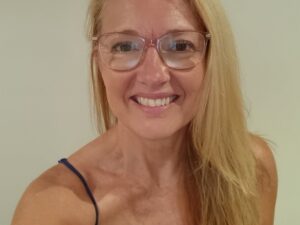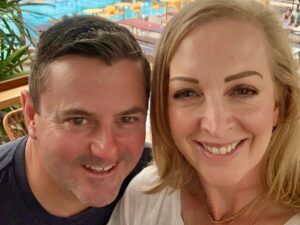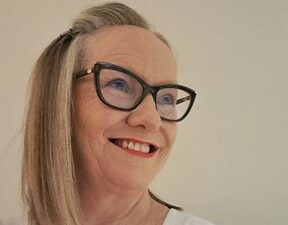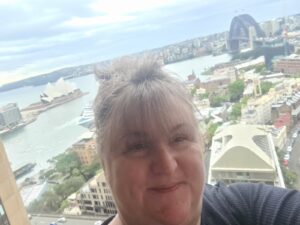I am one of the fortunate NET patients where my NET tumour was found early and treated successfully with surgery.
Following a regular 2-yearly bowel screen test (I had just turned 54) and subsequent colonoscopy in August 2020, I was diagnosed with a NET in my caecum. This was a complete surprise as I had no symptoms and I felt very fit and healthy, both physically and mentally. While it was a concern, I didn’t feel too alarmed until I had further scans to know what we were dealing with. I wasn’t someone who heard the words ‘malignant tumour’ or ‘cancer’ and thought ‘well I am going to die’. I take each step at a time and deal with the information at hand with each step.
A CT scan showed that it had not spread anywhere else thankfully. The tumour and surrounding bowel, tissues and lymph nodes were successfully removed by laparoscopy in September 2020. My tumour was 21 x 18 x 15 mm and diagnosed as well differentiated and grade 1. Follow up FDG PET/CT and Dotatate PET/CT scans did not show any small NET tumours. I was very lucky not to require further treatment, and my monitoring plan is blood tests every 6 months for the next 10 years, and colonoscopy every 2 years for the next 6 years.
I had a very good surgeon who explained what NET was, the benefits and risks of the surgery, willing to answer any questions that I had and was supportive. The surgeon was very pleased he found the NET as it was in a spot that is difficult to see/get to and we both felt very thankful that he persisted to look around the caecum.
I have fully recovered from the surgery recovering and feeling terrific, and I hardly think about my NET. I am extremely grateful for the early diagnosis, that Australia invests in free bowel screening tests, and that we have excellent medical staff, facilities and treatments. I’m the happiest I have ever been in my life.
However before my surgery and during my time in hospital, my surgeon and the staff at the hospital (nurses and nutritionist) did not provide me with any further information about NETS or where I could find reliable information about this. In fact none of the nursing staff even mentioned the word ‘neuroendocrine tumor’ or ‘cancer’ during the 4 days I was in hospital!!
Having a Science background and being in a professional career, I did my own research. There was very limited or no information about NETs on the Australian cancer websites. I finally found the Neuroendocrine Cancer Australia website which was fantastic. There was a lot of good, reliable information that was clearly articulated. I also wrote a message to the NET nurse and within a couple of hours, Kate Wakelin called me and we had a very good chat for about 25 minutes. I received more information about NET as well as comfort and more personal support from Kate in that phone call than I had from my surgeon or staff at the hospital.
While my surgeon and staff at the hospital (nurses and nutritionist) were friendly, helpful when asked, and did a great job with my physical care, there was limited or no discussion about NETs, When I told my surgeon that I found a lot of good, reliable information about NETs on the Neuroendocrine Cancer Australia website, he cautioned me that a lot of the information was more relevant for people who had other type of NETs, NETs that had metastasised, or had more serious symptoms and complications than I had. I told him that I found it very helpful, and that I am a pragmatic person and recognised that I did not have an aggressive NET. I was fully aware that alot of the information on the website that was not all relevant for me, However it also provided me with insight to the range of NETs, and the complexities for different people. I found the patient stories very helpful and particularly as many of them advised ‘to be your own advocate” and to find out as much as you can. Which I did!! I felt a strong connection to people with NETs, even though I hadn’t met them. With limited information about NETs, it was very comforting to know there is a fabulous organisation like Neuroendocrine Cancer Australia to support people with NETs and to advocate for further research and funding. I also viewed a number of the webinars and participated in an information session.
Furthermore, my GP provided me with a hard copy referral for another specialist (for separate reason not NET related) with a copy of the pathology report of the biopsy taken during my surgery. The pathology report was very informative. At the next appointment with my surgeon, I waited for my surgeon to mention the information in the pathology report, however to my surprise he didn’t really say much except my tumour was low grade. I told him I had a copy of the pathology report through my GP. I was very surprised that the surgeon didn’t intend to tell me more about the pathology report. It was only when I raised it that we spoke about the information in detail. This was the first time that my trust in the surgeon reduced a little.
My surgeon has since realised that I am a sensible, pragmatic person, and not being unnecessarily ‘alarmist’ about my situation. I am very positive about my NETs, and still take things one step at a time. He provided me with a copy of my diagnosis and monitoring plan (though I got the sense he wouldn’t normally do so), which was very important to me as I felt empowered and even comforted. However I was concerned that this information isn’t usually provided to people.
My view is that health professionals (surgeons, nurses) should provide all relevant information, including a copy of any reports, to newly diagnosed NET patients. I also think they should provide information about Neuroendocrine Cancer Australia, if the patients wish to have that. I understand that some people can not deal with a lot of information, or may focus on the ‘negative’ information that may not be relevant to their situation. However given many people will ‘google’ information themselves or others will on their behalf, I think it is only right that people are provided with all relevant information to help them feel empowered and to make informed decisions about their health. Cancer organisations such as Cancer Council SA or the Cancer Council Australia should also provide information about NETs or to provide links to Neuroendocrine Cancer Australia.
While I am very fortunate to have a NET tumour that is likely to have been treated with surgery, it was still an unsettling time. Neuroendocrine Cancer Australia has provided me with the most valuable information, support and a level of comfort so I have not felt alone in my journey. I am very grateful for that, and I have donated to the organisation, bought some of the fundraising products in appreciation and stay connected through the newsletter.
A HUGE thank you to Neuroendocrine Cancer Australia. It is very much appreciated by so many NET patients and their families.
Kind regards,
Birgitte





